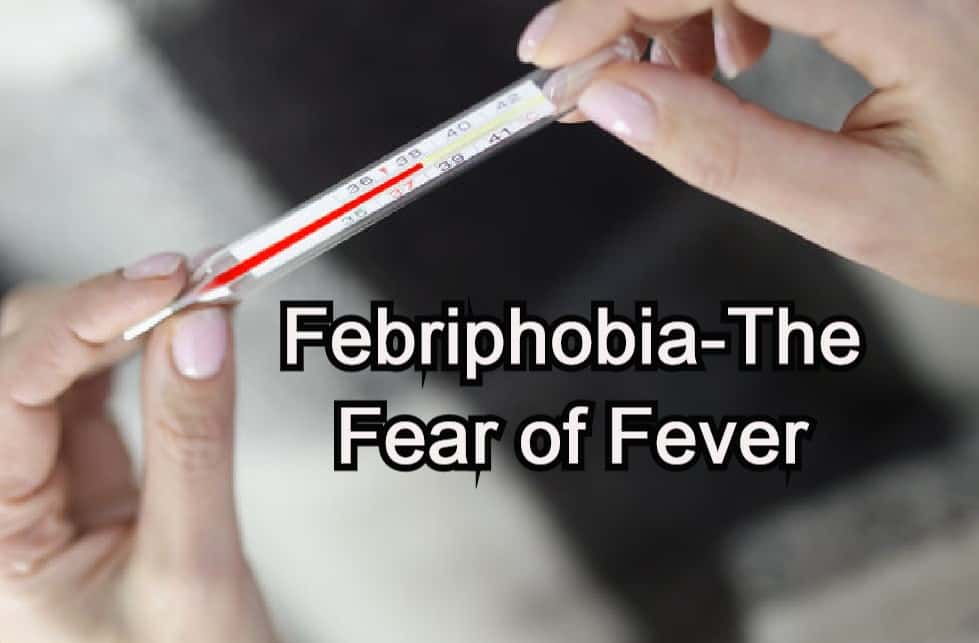Share This Article
Decoding Febriphobia: The Fear of Fever
Do you ever find yourself in tears when a loved one has a mild fever? Do you frequently turn to Google to search for potential symptoms, only to feel a chill run down your spine from the results?
If the thought of a close one suffering from fever leaves you feeling nervous and fearful, you could be struggling with febriophobia, the fear of fever.
Also known as fibriphobia or fibriophobia, this extreme fear of fever can affect people at any age, gender, or social class. So, let’s try and understand febriphobia, and learn about febriphobia treatment to help those who might be suffering from it.

What Is Febriphobia?
Fever is a common medical issue that most children and even some adults encounter. What is not so common is the fear of fever that some caregivers show upon seeing their children suffer with even the most mild of fevers.
No matter how hysterical and exaggerated the phobia may seem to you, it does exist. It is unlikely for a person to develop a fear of fevers, but the few that do suffer from it go through sleepless nights. Although uncommon, it’s helpful to be informed about febriphobia, its causes, symptoms, and treatments, and ways to cope with it.
Fever, which in itself is a symptom of various illnesses and diseases, can evoke anxiety, fear, and other signs of mental agony.
Before we move ahead, it’s important to realize that fever is a sign or a symptom of an infection or a disease that the body may contract, not a disease itself. It is not the fever that disturbs the person suffering from febriphobia, but the complications that accompany it.
If you or a loved one suffers from febriophobia, you will see yourself, or them, experiencing a deep, unpleasant state of restlessness and panic at the mere mention of the term “fever”.
Although considered irrational and exaggerated, this phobia can distract you from doing even the most basic house chores, keep you from concentrating on simple tasks, and become an obstacle. It can take over a better part of you, mentally and physically.
Febriphobia Meaning
The term febriphobia is derived from the Latin word febri, meaning “fever”, and the Greek word Phobia, meaning “fear”.
Febriphobia Causes
Because phobias like febriophobia are rare and not encountered as often as other commonly faced phobias, it’s considered an irrational and unrealistic phobia. That said, just like any other phobia, febriphobia can be caused by multiple factors, some of which are as follows:
Genetic Predisposition
Genetic predisposition is considered one possible and common cause for this phobia. If any of your ancestors had the fear of fever or other phobia, they could have passed it down to you. Heredity, genetics, and body chemistry is a major contributing factor to developing phobias.
Environmental Causes
Environmental causes are also a possibility. Those who grew up in an environment where others around them were susceptible to the horrors of fever are prone to develop febriphobia themselves. Your phobias get rooted into your belief system if you grow up absorbing similar patterns.
Past Traumatic Experiences
Past traumatic experiences happen to be one of the most commonly occurring reasons for developing a phobia. A traumatic childhood event can have a deep-rooted impact on you. It subconsciously remains in the back of your mind. If you’ve had a bad experience with fever, it may become a phobic stimulus for you.
Symptoms of Febriphobia
The severity of a phobia varies from person to person. It’s unlikely for a fear to cause harm, but when you develop a fear, you’re subjected to various symptoms—physical, mental, and emotional—that may reveal the presence of the fear in your mind.
If you suspect you may have developed a fear of fever, keep your eyes peeled for the following symptoms:
Mental/Emotional Symptoms
- Anxiety
- Emotional meltdowns
- Panic attacks
- Mood swings
- Irritability
Physical Symptoms
- Excessive trembling and sweating
- Constant shivers and jitters at the mention of “fever”
- Choking sensation
- Nausea and shortness of breath
- Fast heartbeats
- High blood pressure
- Dry mouth and a feeling of numbness
- Trouble in concentrating
- Constant urge to visit the toilet
- Severe headaches.
- Dizziness
How Do You Deal with Febriphobia?
Before you begin your journey of dealing with febriphobia, defeating it, and emerging fear-free, you need to understand the difference between disgust and fear. Disgust is your emotional response to a stimulus in the form of rejection and repulsiveness. Anything that is considered improper, unpleasant, contaminated, or offensive, can trigger your aversion towards it.
Fear, on the other hand, is the emotion that is evoked when you feel a sense of threat, pain, or danger from an object or situation.
If you think you suffer from the latter when it comes to fevers, you may, unfortunately, be suffering from febriphobia. However, it is nothing to be ashamed of. There are plenty of ways of dealing with it, treating it, and conquering it.
Self-Help: What Can You Do to Help Yourself?
Begin by talking about your phobia with someone you trust. Confiding your fears, no matter how irrational they may seem to you, can help you deal with them. You can also write down your fears and triggers in a journal each time you experience your phobia.
Exercising can also help. No matter how severe or mild your mental and physical agonies are, exercising always helps by fighting off the symptoms, making your body stronger, and your mind healthier.
Professional Help for the Fear of Fever: Options Available
The most accepted, popular, and effective treatment methods for febriphobia are talking treatments. A simple session of counseling with a professional who can identify your behavioral changes and hold a one-on-one session recognizing your fears can help diminish your phobia.
Cognitive behavioral therapy is a leading form of treatment for phobias, including febriphobia. Your therapist identifies the negative thinking patterns that persist in your mind. These patterns can affect your perception of things and situations that can amplify your fears.
Exposure therapy is another common phobia treatment. In exposure therapy, you’re exposed to your fears. You’re encouraged to face your fears each day, little by little, until you are no longer sensitive to the fear of fevers.
How to Cope with Febriphobia?
Practicing something as simple and basic as breathing can help calm you when faced with triggers of febriphobia. Meditation can be helpful as well in treating anxiety induced by the fear of fever. Write in a journal. Talk to friends. See a therapist. Pick a hobby. Expose yourself to your fears.
These are some of the best ways to overcome your fear of fevers. Including such practices in your daily routine will help you to ease the symptoms associated with your phobia and help you lead a better, healthier life.
Final Words
As much as you need to cope with your traumas, try not to be too hard on yourself. Give yourself time to undergo the treatment you need to cope with your fears. Remember, even though your phobia may not be completely cured, it can be diminished to a degree that doesn’t adversely affect you anymore. There is always light at the end of the tunnel.




